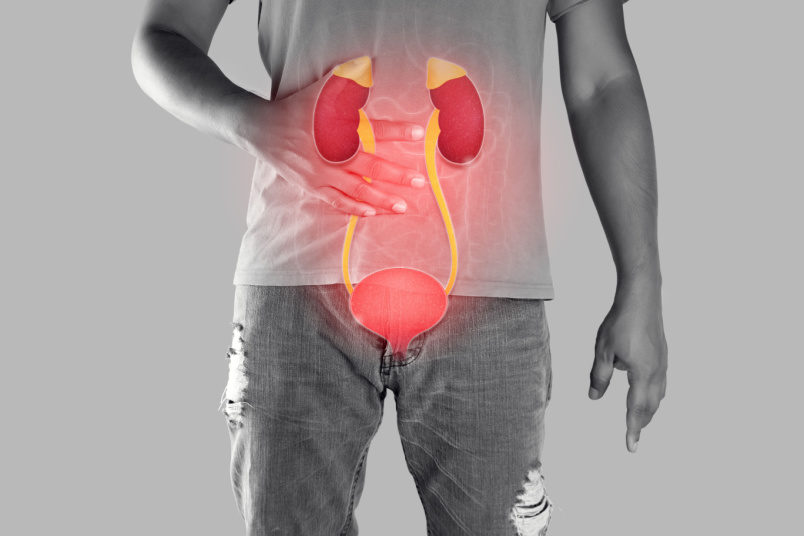The word “cancer” often rings a bell of fear and trepidation in the mind. Out of all the cancers prevalent in the world, bladder cancer accounts for the tenth most common cancer. It is most commonly seen occurring in males (fourth most common cancer in men). Bladder cancer is a relatively rare form of cancer that affects the lining of the urinary bladder. This form of cancer is notorious for a relapse after treatment. So, it is important for people with bladder cancer to be vigilant about follow-up visits with their healthcare provider.
What is bladder cancer?

The human bladder is a triangle-shaped organ, housed between your hip bones, above the urethra and below the kidneys. It is a small, hollow organ that retains urine (pee). Urine from the kidneys drains into the bladder, which is lined with a tissue called urothelium. This lining is made up of cells which stretch when the bladder fills with urine and collapses on voiding out the pee.
Bladder cancer occurs when certain cells in urothelium mutate or change, becoming abnormal cells. These cells multiply and result in tumor in the bladder. If left untreated, the cancer can spread through the bladder walls to the nearby lymph nodes and also invade other areas of the body, including the liver, bones, or lungs. This is called muscle-invasive bladder cancer.
How common is bladder cancer?

Bladder cancer is more commonly seen in males than females. It typically affects people above the age of 55 years. Men are four times more likely to be affected by bladder cancer than women who often tend to ignore the first tell-tale signs of this cancer i.e. blood in urine (haematuria), associating it with some gynecological issue.
Symptoms of bladder cancer

The most common symptom of this cancer is the presence of blood in the urine (haematuria), which occurs all of a sudden and is generally not painful. Some of the other lesser known symptoms of bladder cancer include the following:
- Problems in voiding out the urine
- Burning sensation while urinating
- Urge to pass urine frequently
- Pain while urinating (dysuria)
- Persistent bladder infections
- Lower bladder or back pain (less common)
Causes of bladder cancer

Although the exact cause of why bladder cells mutate and become cancerous is not known, there are some speculations regarding the possible causes of bladder cancer. Following are some of the identifiable causes of developing bladder cancer:
-
Cigarette smoke: Smoking cigarettes, pipes, and cigars or being exposed to second-hand smoke doubles the risk of developing bladder cancer. This is because harmful chemicals tend to accumulate over time due to constant smoking. When one smokes, the chemicals in the smoke are processed by the body which excretes some of them in the urine. As a result, these harmful chemicals damage the lining of the bladder, increasing the chances of developing bladder cancer.
-
Radiation exposure: This is the second most potential reason for developing bladder cancer, especially if you are exposed to radiation for cancer treatment during radiation therapy.
-
Increasing age: Although it can occur at any age, bladder cancer is most commonly seen to develop with advancing age (over 55 years).
-
Male gender: Men are more susceptible to developing bladder cancer than women.
-
Chemotherapy: Certain drugs used in chemotherapy are known to increase the risk of developing bladder cancer.
-
Exposure to certain chemicals: This is an occupational hazard which is a threat to people working and handling certain chemicals used in dyes, paint, rubber, leather, some textiles, and hairdressing supplies.
-
Personal or family history of cancer: A person who has already had bladder cancer is most likely to suffer from it again. On the other hand, if you have a blood relative (parent, sibling, or child) with a history of bladder cancer, it makes you more prone to it
-
Frequent bladder infections: People who are prone to having very frequent bladder infections, bladder stones are at an increased risk of developing squamous cell carcinoma, a type of bladder cancer.
-
Chronic catheter use: Another cause of developing squamous cell carcinoma, is constant long standing use of catheter in the bladder.
The last two are the rarest of the causes.
Timely management and treatment of bladder cancer is important to curb the cancer from spreading to nearby organs. Knowing what causes bladder cancer and taking steps to eliminate these risk factors will go a long way in keeping you healthy and disease-free.
NU Hospitals is a premier center that caters to the health problems of the common man. Located in Bangalore (India), this hospital offers state-of-the-art facilities and world-class equipment for treating bladder cancer. Consult an expert urologist at NU hospitals and get rid yourself from the ravages of bladder cancer !!
References.
Author: Dr. Vinod Kumar P +Dr. Pradeepa M G

